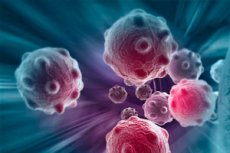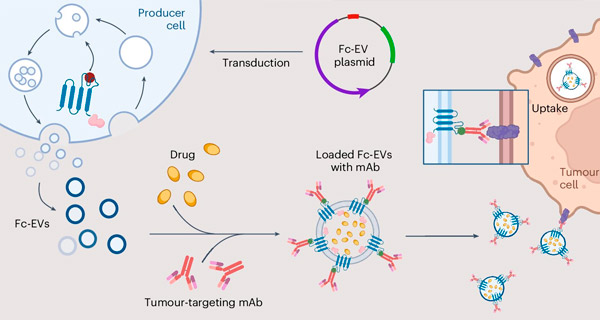
Researchers at Karolinska Institutet in Sweden have been able to deliver targeted cancer treatments using small membrane vesicles that cells use to communicate. The study, "Antibody-loaded exosomes for targeted cancer therapy," published in Nature Biomedical Engineering shows that the treatment reduces tumor growth and improves survival in mice.
When our cells communicate, they send out small membrane-bound vesicles known as extracellular vesicles, which contain various signaling molecules. Interest in these tiny bubbles, sometimes called our body's "message in a bottle", has increased in recent years as they can be used to deliver drugs.
Antibodies target tumors
Researchers at Karolinska Institutet have created a targeted cancer treatment by loading these vesicles with a chemotherapy drug and attaching anti-tumor antibodies to their surface. In addition to targeting tumor cells, antibodies also act as a form of immunotherapy, enhancing the therapeutic effect. The treatment reduced tumor growth and improved survival when administered to mice with breast cancer or melanoma.
"By attaching different antibodies to extracellular vesicles, we can target them to almost any tissue and load them with other types of drugs," says Oskar Wiklander, a physician and researcher at the Department of Laboratory Medicine at Karolinska Institutet and one of the first authors of the study along with Doste Mamand, a researcher from the same department. "The treatment could therefore be used against other diseases and types of cancer."

Engineering cells to produce vesicles with an Fc domain-specific antibody-binding motif. Source: Nature Biomedical Engineering (2024). DOI: 10.1038/s41551-024-01214-6
More effective treatment with fewer side effects
The hope is that the new treatment will be more specific and effective in killing tumor cells without affecting healthy tissue than current treatment strategies. The researchers plan to study whether different combinations of antibodies and drugs could further improve treatment.
“In particular, we want to explore the possibility of delivering mRNA as an anti-cancer drug,” says the study’s final author, Samir El Andaloussi, professor in the department of laboratory medicine at Karolinska Institutet.
"Ultimately, we hope this will lead to a new treatment platform that can improve treatment efficacy and reduce side effects in difficult-to-treat diseases, especially cancer."

